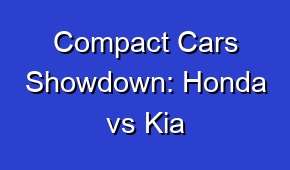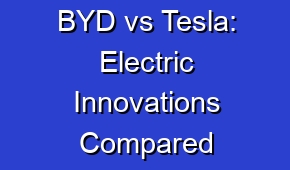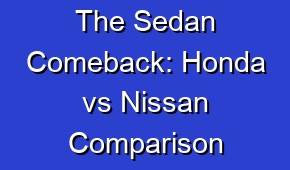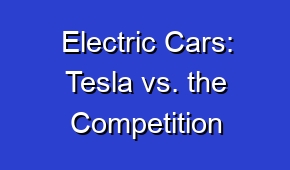Hyundai vs Kia: A Sibling Rivalry?
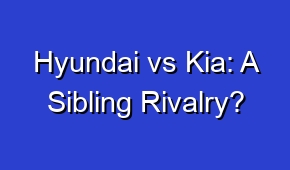
Discover the intriguing relationship between Hyundai and Kia in this article as we delve into their sibling rivalry. Uncover the similarities, differences, and competition that exist between these two automotive giants.
Hyundai and Kia: Sibling Rivalry? The relationship between Hyundai and Kia has long been a topic of debate in the automotive industry. While both brands are part of the same South Korean conglomerate, they have managed to maintain their individual identities and compete fiercely in the market. The question of whether they are truly rivals or not is often raised, given their shared resources and similar product offerings. However, it is clear that there is a healthy competition between the two, as they strive to outdo each other in terms of design, technology, and performance. This rivalry has led to constant innovation and improvement, benefiting consumers who have a wide range of options to choose from. Whether you prefer the sleekness of Hyundai or the sportiness of Kia, one thing is for certain – this sibling rivalry has resulted in some impressive vehicles.
| Hyundai and Kia are two popular car brands with a close relationship. |
| Both Hyundai and Kia are part of the same automotive group. |
| The sibling rivalry between Hyundai and Kia drives healthy competition in the market. |
| Hyundai and Kia share technologies, platforms, and components in their vehicles. |
| Despite similarities, Hyundai and Kia maintain distinct brand identities. |
- Hyundai and Kia often compete for market share in similar vehicle segments.
- The rivalry between Hyundai and Kia leads to continuous innovation and improvement.
- Customers can choose between Hyundai and Kia based on personal preferences and brand perception.
- Hyundai and Kia offer a wide range of models to cater to different customer needs.
- Both Hyundai and Kia have a strong presence in global markets, including the United States.
What is the history of Hyundai and Kia?
Hyundai and Kia are two South Korean automobile manufacturers that have a shared history. Hyundai was founded in 1967, while Kia was established in 1944. In 1998, Hyundai acquired a majority stake in Kia, making them sister companies under the Hyundai Motor Group. Since then, they have operated as separate brands but have collaborated on various projects.
| Year | Hyundai | Kia |
| 1947 | Hyundai Engineering and Construction Company established. | – |
| 1967 | Hyundai Motor Company founded. | – |
| 1974 | – | Kia Motors Corporation established. |
| 1986 | Hyundai exports its first car, the Excel, to the United States. | – |
| 1998 | Hyundai acquires a majority stake in Kia Motors. | – |
| 2000 | Hyundai-Kia Automotive Group is formed. | – |
| 2009 | Hyundai surpasses Honda in global sales. | – |
| 2017 | Hyundai and Kia combined become the world’s fifth-largest automaker. | – |
| 2021 | Hyundai announces plans to transition into a mobility provider. | Kia unveils its new logo and brand strategy. |
What is the relationship between Hyundai and Kia?
The relationship between Hyundai and Kia can be described as a sibling rivalry. While they are both part of the same parent company, they compete with each other in the global automotive market. They share platforms, technologies, and some components, but each brand has its own unique identity and target audience.
- Hyundai Motor Company and Kia Motors Corporation are both South Korean automotive manufacturers.
- Hyundai Motor Company is the parent company of Kia Motors Corporation, as Hyundai owns a significant stake in Kia.
- Although Hyundai and Kia operate as separate brands, they share platforms, technologies, and some manufacturing facilities, leading to similarities in their vehicle lineups.
How do Hyundai and Kia compare in terms of quality?
Both Hyundai and Kia have made significant improvements in terms of quality over the years. They have invested heavily in research and development, resulting in vehicles that are known for their reliability and durability. In recent years, both brands have received numerous awards for their quality and performance.
- Both Hyundai and Kia have made significant improvements in terms of quality in recent years.
- Hyundai has been consistently ranked higher in quality and reliability compared to Kia by various automotive publications and consumer reports.
- Hyundai offers longer warranties compared to Kia, which indicates their confidence in the quality of their vehicles.
- While Kia has also improved its quality, it still lags behind Hyundai in terms of overall perception and reputation.
- In terms of specific models, Hyundai’s luxury brand Genesis has received higher praise for its quality and performance compared to Kia’s luxury brand, K900.
Which brand offers better value for money: Hyundai or Kia?
When it comes to value for money, both Hyundai and Kia offer competitive options. They provide a range of vehicles that cater to different budgets and needs. It ultimately depends on individual preferences and requirements. It is recommended to compare specific models from each brand to determine which one offers the best value for money.
| Brand | Hyundai | Kia |
| Reliability | Hyundai vehicles are known for their reliability. | Kia vehicles are also known for their reliability. |
| Warranty | Hyundai offers a 5-year/60,000-mile basic warranty and a 10-year/100,000-mile powertrain warranty. | Kia offers a 5-year/60,000-mile basic warranty and a 10-year/100,000-mile powertrain warranty. |
| Value for Money | Hyundai vehicles generally offer good value for money with competitive pricing. | Kia vehicles also offer good value for money with competitive pricing. |
What are the popular models from Hyundai and Kia?
Hyundai and Kia offer a wide range of popular models that cater to various segments of the market. Some popular Hyundai models include the Sonata, Elantra, and Tucson, while Kia has popular models such as the Optima, Forte, and Sportage. These models are known for their reliability, performance, and features.
The popular models from Hyundai and Kia include the Hyundai Sonata, Hyundai Elantra, Kia Sportage, and Kia Sorento.
Are Hyundai and Kia vehicles fuel-efficient?
Both Hyundai and Kia have made significant advancements in terms of fuel efficiency. They offer a range of vehicles with efficient engines, hybrid options, and even electric vehicles. Many of their models boast impressive fuel economy ratings, making them environmentally friendly choices for consumers.
Hyundai and Kia vehicles are known for their fuel-efficient performance, offering excellent mileage and eco-friendly features.
What is the future outlook for Hyundai and Kia?
The future outlook for Hyundai and Kia is promising. Both brands continue to invest in research and development to stay at the forefront of automotive technology. They are expanding their electric vehicle offerings and exploring autonomous driving technologies. With their commitment to innovation, Hyundai and Kia are poised to remain competitive in the global automotive industry.
1. Electric Vehicle Market
The future outlook for Hyundai and Kia looks promising, especially in the electric vehicle market. Both companies have been investing heavily in electric vehicle technology and have already introduced several electric models. With the global shift towards sustainable transportation, the demand for electric vehicles is expected to increase significantly in the coming years. Hyundai and Kia’s strong focus on electric vehicles positions them well to capitalize on this trend and gain a larger market share.
2. Autonomous Driving Technology
Another area of opportunity for Hyundai and Kia is autonomous driving technology. Both companies have been actively developing and testing autonomous vehicles. As self-driving cars become more mainstream, Hyundai and Kia’s expertise in this area can give them a competitive edge. The advancements in autonomous driving technology are expected to revolutionize the automotive industry, and Hyundai and Kia are well-positioned to be at the forefront of this transformation.
3. Global Expansion
Hyundai and Kia have been expanding their presence globally, particularly in emerging markets such as China and India. As these markets continue to grow and their middle class expands, the demand for automobiles is expected to rise. Hyundai and Kia’s focus on producing affordable and reliable vehicles makes them attractive options for consumers in these markets. By strengthening their global footprint, Hyundai and Kia can tap into new customer bases and increase their market share worldwide.

